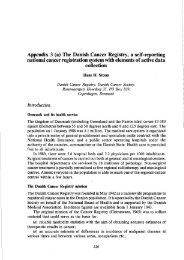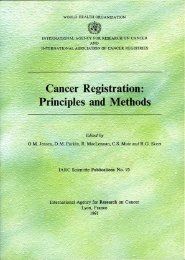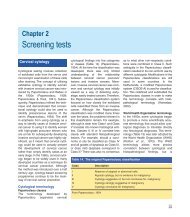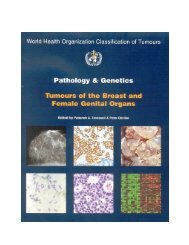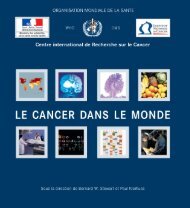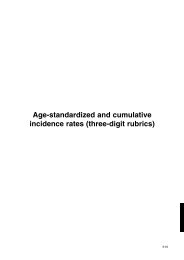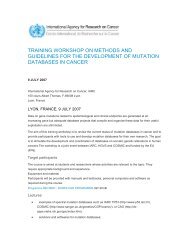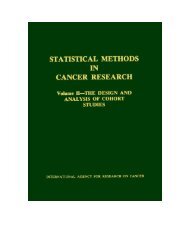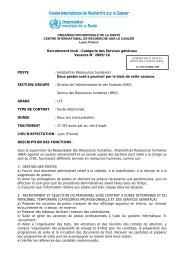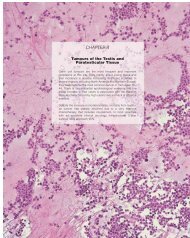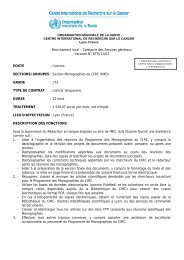world cancer report - iarc
world cancer report - iarc
world cancer report - iarc
Create successful ePaper yourself
Turn your PDF publications into a flip-book with our unique Google optimized e-Paper software.
ecords departments are either rudimentary<br />
or do not exist in many sub-Saharan<br />
African countries and are poorly developed<br />
in many countries in Asia.<br />
The importance of establishing and maintaining<br />
information systems, particularly population-based<br />
<strong>cancer</strong> registries, to support and<br />
evaluate <strong>cancer</strong> control programmes is clear.<br />
The organization of population-based <strong>cancer</strong><br />
registries covering selected regions with particular<br />
<strong>cancer</strong> health services seems to be<br />
the most feasible approach in the short term.<br />
Much more sustained and coordinated<br />
efforts are required to develop a reliable mortality<br />
registration system for the entire country.<br />
The evolution of a network of <strong>cancer</strong> registries<br />
under the National Cancer Registry<br />
Programme of India provides a good example.<br />
Primary prevention efforts<br />
There are no dedicated and sustained primary<br />
prevention programmes for <strong>cancer</strong> in<br />
many developing countries. However, there is<br />
wide recognition that efforts should be made<br />
to create awareness at the community level.<br />
Thus individuals may be encouraged to adopt<br />
healthy lifestyles, based on informed choice,<br />
as a means to control common <strong>cancer</strong>s.<br />
There has been very little focus in developing<br />
countries on educational initiatives concerned<br />
with <strong>cancer</strong> prevention, such as<br />
tobacco control, guidelines on diet and alcohol<br />
consumption, avoidance of exposure to<br />
certain infections, promotion of physical<br />
activity and so on. Thus far, health education<br />
for <strong>cancer</strong> has been largely the outcome of<br />
periodic, sporadic activities by <strong>cancer</strong> societies<br />
or <strong>cancer</strong> treatment establishments.<br />
The implementation of fiscal measures, such<br />
as taxation, impacting upon tobacco and<br />
alcohol control, is the responsibility of<br />
Finance Ministries in many countries. Such<br />
decisions may be influenced by revenue considerations,<br />
commercial and agricultural<br />
pressures, and least of all, by public health<br />
concerns and advocacy. Pricing policies for<br />
tobacco and alcohol are important factors<br />
influencing consumption, and are relevant to<br />
<strong>cancer</strong> prevention. To a large extent, pricing<br />
may have contributed to preventing large<br />
increases in the consumption of processed<br />
tobacco products such as cigarettes in many<br />
sub-Saharan African countries and in the<br />
Indian subcontinent. Long-term policies to<br />
provide alternative agricultural and commercial<br />
employment for those previously<br />
involved in tobacco production, marketing<br />
and sales have so far received very little<br />
attention in those countries where the tobacco<br />
industry is a major contributor to the<br />
economy.<br />
Legislative measures may impinge on advertising,<br />
health warnings, sales and consumption<br />
of tobacco products and alcohol, as well<br />
as reducing occupational exposure to hazardous<br />
substances. Often, there is no lack of<br />
enactment of such legislation by governments.<br />
However, very little attention has<br />
been paid to the means of implementing<br />
these measures by the various agencies concerned<br />
with their enforcement. In fact, exist-<br />
Regions Number of countries with data available for the 1990s<br />
Fig. 7.7 Women participating in WHO cervical <strong>cancer</strong><br />
screening in Ambillikai, South India (supported<br />
by the Bill and Melinda Gates Foundation).<br />
Fig. 7.8 The medicine cupboard in a health care<br />
centre in Burkina Faso. Resources are scarce and<br />
essential medicines are often in short supply.<br />
ing legislative measures often remain to be<br />
implemented or enforced in many countries,<br />
sometimes for want of better awareness, willingness<br />
and coordination among different<br />
agencies.<br />
Though some 31 high and intermediate-risk<br />
developing countries have implemented hep-<br />
Incidence data published 1 Population-based <strong>cancer</strong> survival 2 Mortality data 3<br />
Africa 8 None 1<br />
(56 countries)<br />
Central and South America 6 None 5<br />
(21 countries)<br />
Caribbean 3 1 2<br />
(8 countries)<br />
Asia 13 5 7<br />
(44 countries)<br />
1 Based on Cancer Incidence in Five Continents, Volume VIII, peer-reviewed papers and registry <strong>report</strong>s.<br />
2 References [5, 6]<br />
3 WHO Cancer Mortality Database (as available on http://www-depdb.<strong>iarc</strong>.fr/who/menu.htm)<br />
Table 7.1 Availability of <strong>cancer</strong> incidence, survival and mortality data from South America, Africa and Asia.<br />
Cancer control in developing countries<br />
313



